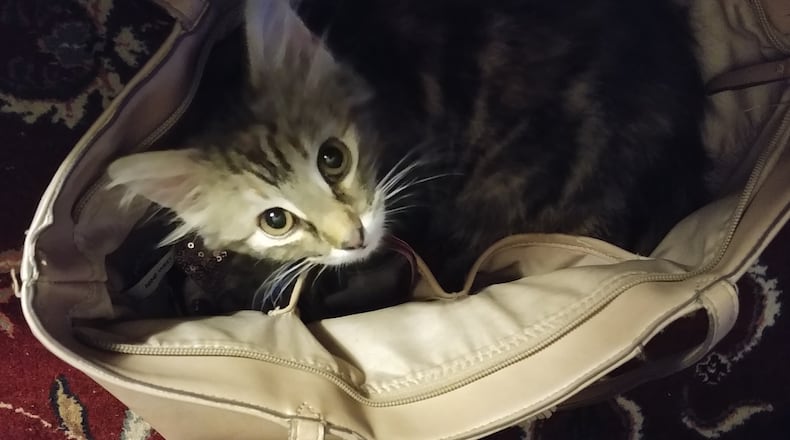My family couldn’t foster. We’d have a home filled with pets.
The fastest foster fail I’ve heard about was from Lora, the owner of Van Lear Custom Couture in Miamisburg. It took her less than a minute.
Lora explained the circumstances that started her fostering:
“I had a little white dog. Her name was Lexi and I reluctantly got very attached to her. In mid‑July of 2020, I could tell she wasn’t feeling too well. I took her to the vet. Covid rules prevented me from being able to go in with her. The vet called me while I waited in the parking lot. She was dying of congestive heart failure.”
“Needless to say, I was torn up. I wasn’t allowed to be with her while she died. I sobbed in my car in the parking lot. The whole thing was so painful. I promised myself I would never ever let another pet into my heart or life. And I meant it.”
But just a few weeks later Lora was at her shop talking on the phone with a business acquaintance when she asked the woman about her weekend. The acquaintance said her husband found two hours-old kittens. They waited for the mama before touching them, but she didn’t return. She said the local animal shelters wouldn’t take them because they were too young. One baby had passed the first night. Because of allergies, they were looking for someone to foster the surviving kitten.
Even though Lora had not fostered a kitten, she offered to help. She would foster it without any emotional attachments. In eight weeks, the kitten would be placed in its forever home.
Lora’s reaction to holding the tiny kitten was instant:
“I held this baby in the palm of my hand. I knew immediately that I was already a foster fail.”
To keep the kitten thriving required giving him a bottle every two hours. Lora’s son took the night shift. Maintaining the feeding schedule meant bringing “Stevie,” named after Stevie Wonder, to the shop. Customers who had known Lexi were happy to meet the shop’s new mascot. Lora soon learned Stevie was a “she,” but the kitten was already responding to “Stevie,” so she didn’t change the name.
At eight weeks, Lora decided to leave Stevie at home until she got through the climbing stage, but she was concerned because the sweet girl was attached to her. As she explained, “If I am seated, she is in my lap.”
Lora described herself as a nervous mom when she adopted Stevie. “I wouldn’t leave her home alone or leave her in my car to go into a store,” she said. “I carried her in my purse everywhere. She still climbs into my purse to hang out and take naps.”
Her son offered to adopt a playmate from SICSA and soon an 8-week-old ginger, “Oscar,” joined their family. When her son moved to Florida, the big, goofy, loud-purring kitten stayed.
The day after Oscar joined the family, a woman showed up at the shop. When Lora answered the door, she noticed the woman’s hands were behind her back. Lora suspected a solicitor. Barely cracking open the door, she was ready to close it and be done with whatever she was selling.
The woman asked if Lora was the lady that rescues kittens. By now, many of her customers knew Stevie’s rescue story. Lora described her response: “I paused, trying to decide if ‘yes’ was going to be a good answer. I owned my new reputation and from behind her came a 4-week-old black-and-white kitten. She found him on the street and added that her husband would divorce her if she came home with any more animals. What could I do? I had to help her and save her marriage.”
Lora did the mandatory waiting period before introducing “David,” named for the David Rosethe character in “Schitt’s Creek,” to Stevie and Oscar. She worried the smaller and 1-month-younger kitten might be bullied by the other two. But when Lora allowed David into the room with Stevie and Oscar, the curious and mischievous kitten made it clear he wasn’t afraid of anything.
People still call or stop by to ask if Lora is rescuing cats, but she says, “I let the word get around town that I no longer rescued kittens, cats or any other animals.”
Many fosters fail because of the unbreakable bond that forms. Lora is no exception.
“My friends and my two kids worried that I was going to fill my house with cats,” she said. “I have been tempted to at least foster more kittens, but I tend to agree that I would end up with 50 cats. I’m happy with my three little rescues.”
Karin Spicer is a member of The Dog Writers Association of America. She lives with her family and two furry animals who inspire her. She can be reached at spicerkarin@gmail.com.
Four signs you are ready to foster an animal
1. You want to help transform a shelter dog into a pet, help another family find the right dog.
2. You want to see if you’re ready for the lifelong emotional and financial commitment of being an animal owner.
3. Your current dog needs some canine companionship.
4. You have the space, time to give a foster the attention she needs.
About the Author
